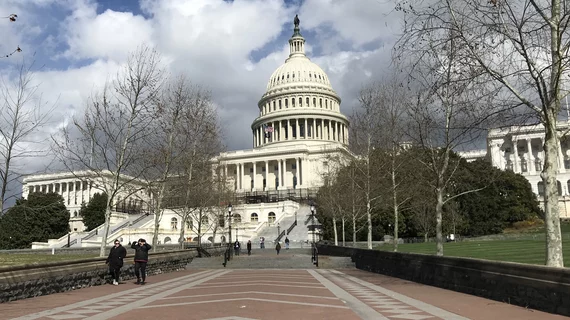SCAI calls on interventional cardiologists to tell Washington to reverse physician pay cuts
Congress is considering legislation to prevent or mitigate the Medicare physician payment cuts that went into effect in January 2024, and the Society for Cardiovascular Angiography and Interventions (SCAI) is urging its members to mobilize and write their Congressmen to weigh in on the bill.
The 2024 Medicare Physician Fee Schedule included a 3.37% reduction from the conversion factor used and the continued implementation of changes to the clinical labor pricing formula implemented by the Centers for Medicare and Medicaid Services.
"These cuts harm doctors who participate in Medicare and threaten our patients’ access to care." SCAI said in a statement. "SCAI is calling on interventional cardiologists to contact their lawmakers immediately to support legislation that will prevent or mitigate the effects of these cuts. Thanks to your effort, we were able to mitigate cuts in 2023, and we aim to do so again for 2024."
Congress is considering H.R. 6683, the Preserving Seniors’ Access to Care Act, and H.R. 3674, the Providing Relief and Stability for Medicare Patients Act, to prevent Medicare cuts in 2024. Both of these bills aim to compensate physicians more fairly by Medicare.
Medicare is required by law to maintain budget neutrality, meaning that any increase in costs needs to have a corresponding cut in payments elsewhere to keep the budge balanced. As the number of Medicare patients increases and there is wider use of advanced medical imaging, testing and new therapies, the amount paid to physicians generally declines year-over-year. Doctors also are the only healthcare providers in Medicare that do not get an annual payment update tied to inflation. With inflation rates being very high the past couple years, the impact of these cuts have been even more severe.
Over the past 20 years, the American Medical Association (AMA) said Medicare cuts to physicians, adjusted for inflation, have resulted in about a 26% reduction in what Medicare used to pay.
The AMA, SCAI and many other physician organizations have repeatedly called for reform to the Medicare payment system, or else payments will drop below the actual costs of delivering care and this may result in Medicare patients being turned away.
As a result, physicians have seen their payments decline by 26% since 2001, adjusted for practice cost inflation. While large healthcare providers continue to consolidate our health system, delivering lower-quality care for patients at higher costs, physicians are feeling the financial pressure. This pressure is only exacerbated by the continued implementation of clinical labor pricing changes. Those changes devalue the work and significant expense that is required for many specialist doctors to operate, and must be corrected.
"SCAI has activated its grassroots network to remind lawmakers that physicians are the only group under Medicare that haven’t received an inflation update in more than 20 years. The average interventional cardiologist is 54 years old. Burnout, high stress, and other factors are driving interventional cardiologists to leave the field. Before Congress adjourns this year, critical Medicare reforms must be enacted before patient care is drastically affected," explained SCAI Advocacy Committee Chair Arnold Seto, MD, MPA, FSCAI, in a statement to Cardiovascular Business.
The text of the sample letter SCAI put together for its members to submit to legislators included grim language.
"Without urgent Congressional action, the future of Medicare is grim. Irreversible structural changes to our healthcare system are underway through healthcare consolidation, while more doctors leave the Medicare program entirely, choosing to move into concierge care or simply retire. In total, the United States has a shortfall of 37,000 physicians, which will rise well over 100,000 in the next decade. American seniors will suffer the most from these changes, particularly in rural and underserved areas," the SCAI letter states.
Irreversible structural changes in cardiology underway due to lack of Medicare payment reform
Medicare payments for hospitals have been more favorable, including added annual inflationary increases. These factors have been major contributors to changing cardiology from being 90% private practices a decade ago, to being less than 10% today. In addition to most cardiologists now working for healthcare systems, these economics have also led to an increase in private equity ownership of cardiology practices.
There have been major lobby pushes by the AMA and all the physician medical societies for years to have Congress work on comprehensive Medicare payment reform bill, but Congress has failed to act. Instead, there are usually band-aid efforts at the end of each year to try and avoid new cuts, but none of these efforts are permanent.
For more information on the SCAI efforts.

